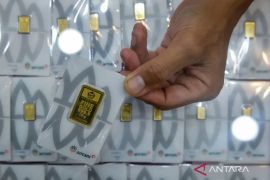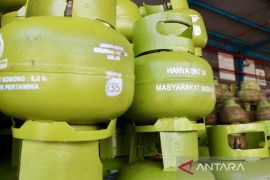Jakarta (Antara Bali) - Global economic gloom and the pronged drop in world commodity prices have affected businesses in Indonesia, with scores of large companies being forced to shut down their factories.
A score of major companies, such as PT Toshiba, PT Panasonic, PT Chevron Pacific Indonesia, and PT Ford Motor Indonesia are planning to close their factories in Indonesia, which will result in massive layoffs of workers.
This will lead to thousands of Indonesian workers being laid off and becoming unemployed.
The Indonesian Workers Union Federation recorded that the number of workers affected by the layoffs has reached 1,700 at PT Panasonic, 970 at PT Toshiba, 1,000 at Panasonic Lighting Cikarang Bekasi, 1,200 at PT Samoin, and 500 at PT Starlink.
"These layoffs will threaten the livelihoods of the victims families, particularly nondescript workers. I hope the government will think of the impact of the layoffs and take anticipatory steps," legislator Okky Asokawati, a member of Commission IX on manpower of the House of Representatives (DPR) said on Thursday.
She said a number of companies, such as Toshiba, Panasonic, Ford and Chevron have stated their plans to close their factories and reduce their workforce.
"This will cause an extraordinary impact on Indonesia and thousands of workers will be laid off," she said.
The legislator said the layoffs of thousands of workers will have a serious impact on the quality of life of the victims families.
"The demographic bonus Indonesia will have by the year 2030 will therefore be useless," said Okky.
She urged Manpower Minister Hanif Dhakiri to coordinate with the relevant ministries and institutions to reduce the impact. "There must be concrete formulations and short term actions taken to overcome this problem," Okky, who is a politician of the United Development Party (PPP), said.
Earlier, the Executive Director of the Institute for Development of Economic and Finance (Indef) Enny Sri Hartati told the press she was not surprised with the news on the plans of foreign companies to shut down their factories.
She said various polices adopted by the government were less supportive of old investors, but had favored new or prospective investors.
"The various economic policy packages from package one to package nine are designed to attract new investors," she said, adding that the government should have chosen polices, which favored old investors, who had been active in Indonesia for a long time. Thus, they would be encouraged to develop their businesses further and increase their investment.
"Economic packages, which support old investors, will be maintained and encourage them to increase and boost their investment," said Enny.
In the meantime, Edy Putra Irawady, the deputy for Commercial and Industrial Coordination at the Coordinating Ministry for Economic Affairs, said one of the reasons companies were shutting down their factories and laying off their workers is the global economic slowdown.
"This is a business dynamic caused by the decline in world export demand, which is being experienced not only by Indonesia but also by other countries in the world. This external factors create the risk," he said.
He further said the government had taken anticipatory steps and made efforts so that the industrial sector absorbs workers even if in a difficult situation.
These steps included the development of small businesses, logistics boded zones, and setting up special economic zones with special incentives to boost the competitiveness of industry.
These are all aimed at developing micro businesses that can provide new jobs even in difficult times.
Thus, according to the Central Bureau of Statistics (BPS), micro businesses which do not import raw materials can develop in a difficult time.
After all, according to BPS Chief Suryamin, the layoffs to be conducted by several companies will not always influence the poverty rate.
"It will not always have an impact (on the poverty level). Moreover, those planning to lay off workers are big companies. It will be seen later whether there will be an impact at the micro level," the BPS head noted on Thursday.
He said the government is currently boosting the development of micro businesses, which do not import raw materials.
"These micro businesses can also absorb (workers). We will see later this February," he noted.
However, layoffs will affect the economy if more companies sever work relations with their workers, while there are not many new job opportunities in the micro sector.
"The impact of the layoffs will be seen only in the year ahead. We will see what it will be like at the end of 2016. Moreover, there is already a significant growth in micro businesses," he noted.
Chief Economic Minister Darmin Nasution said companies might have planned to lay off their workers as they are unable to compete in the market. "Companies might have planned to lay off their workers as they are unable to compete with their counterparts from South Korea and China," Darmin stated after a meeting with Vice President Jusuf Kalla to discuss efforts to reduce poverty.
Several Korean and Japanese electronics companies are reported to have planned to shut down their factories in Indonesia. However, Darmin refused to claim that there will be massive layoffs, affirming that these companies might have planned to close their factories not because they do not intend to invest in Indonesia but are, in fact, losing to competition from other companies.
Executive Secretary of the National Poverty Eradication Acceleration Team (TNP2K) Bambang Widianto emphasized the need to attract new investors to overcome the layoff problem.
"This is something usual as technology is changing. Those affected by the layoffs must seek employment in other companies. Therefore, new investment is needed," he pointed out.
The same view was also expressed by the head of the Capital Investment Coordinating Board (BKPM), Franky Sibarani.
He said the best thing that needed to be done at this time was to maintain a positive investment climate by making it easier for companies to obtain licenses and carry out further deregulation.
"We are improving the business climate, revising the investment negative list (DNI), providing three-hour business license service as part of an integrated one-stop service and are granting tax allowance and tax holiday facilities," he said. (WDY)









